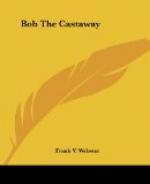“Our boat must have been close to the island when it capsized,” replied the former commander of the Eagle. “A big wave did the business for us, and then it was every man for himself. Poor Tarbill, he’s lost, and so is Pete Bascom. We’ll never see either of ’em again. And I’m afraid the rest of the crew are gone, too. No boat could live long in that sea.”
“Mr. Tarbill is alive,” said Bob.
“How do you know?”
“He’s right behind those rocks. He didn’t come on because he feared you were cannibals. I’ll call him.”
Bob set up a shout, and in a few seconds the nervous passenger came cautiously over the top of a pile of stones. When he saw Captain Spark he was reassured and advanced boldly. There was a general shaking of hands, and then the captain remarked:
“Well, now we’re here we’ll have to sec what we can find in the way of food and shelter. I don’t believe this island is inhabited. I didn’t know we were so near one. It isn’t down on the charts.”
“There is plenty of fish and fruit,” said Bob, telling how he had used his hook and line to advantage.
“Good!” exclaimed the captain. “I could eat a fish raw, I believe, and my mouth is dry for need of some fresh water.”
“Then come on to my camp,” said Bob, proudly leading the way,
The captain could not but note the change in the boy. He had a confident air about him now, as if he could take charge of matters. The experience of the shipwreck, terrible as it had been, had taught Bob some needed lessons. But he had yet more to learn.
While Captain Spark and Tim Flynn were wringing the water out of their heavier garments Bob replenished the fire and soon had some fish broiling, for he had caught more than he needed. It did not take long to finish the simple meal, and then the captain spoke.
“We’d better take a survey of the island,” he said, “to see what sort of a place we’ve landed on. If there are any natives here we want to know it. We also want to know what we can expect in the way of things to eat and if there are animals on it. I don’t believe there are, however, as the place is too small.”
“Let’s start right away,” proposed Bob. “Perhaps we can find some driftwood, or something to make a hut of, though it’s warm enough to sleep out of doors without shelter.”
“But not exactly safe in tropical countries,” objected the captain. “I hope we can construct some kind of a house. If we can’t we’ll have to make the best of it, though, for we haven’t any tools to work with, except knives.”
They started to make a circuit of the island. It was not very large, being about two miles across. The center was thickly wooded with tropical growth, and the captain was glad to note that there were several varieties of good fruit, including a number of cocoanut trees.
“If worst comes to worst we can make a hut of cocoanut leaves,” he said. “The natives often do that.”




